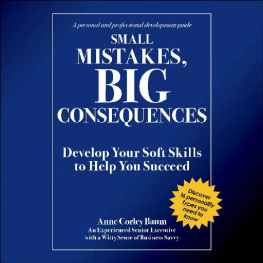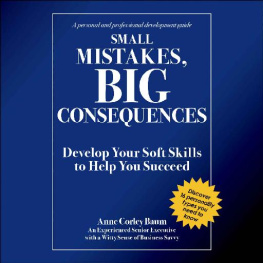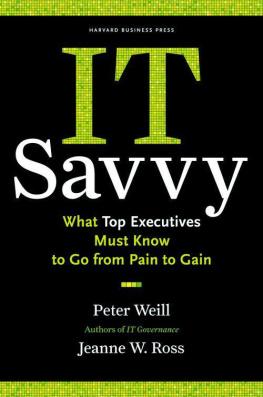Baum - SMALL MISTAKES, BIG CONSEQUENCES: business savvy to help you succeed
Here you can read online Baum - SMALL MISTAKES, BIG CONSEQUENCES: business savvy to help you succeed full text of the book (entire story) in english for free. Download pdf and epub, get meaning, cover and reviews about this ebook. year: 2018;2019, publisher: Momosa Publishing LLC, genre: Home and family. Description of the work, (preface) as well as reviews are available. Best literature library LitArk.com created for fans of good reading and offers a wide selection of genres:
Romance novel
Science fiction
Adventure
Detective
Science
History
Home and family
Prose
Art
Politics
Computer
Non-fiction
Religion
Business
Children
Humor
Choose a favorite category and find really read worthwhile books. Enjoy immersion in the world of imagination, feel the emotions of the characters or learn something new for yourself, make an fascinating discovery.
- Book:SMALL MISTAKES, BIG CONSEQUENCES: business savvy to help you succeed
- Author:
- Publisher:Momosa Publishing LLC
- Genre:
- Year:2018;2019
- Rating:4 / 5
- Favourites:Add to favourites
- Your mark:
- 80
- 1
- 2
- 3
- 4
- 5
SMALL MISTAKES, BIG CONSEQUENCES: business savvy to help you succeed: summary, description and annotation
We offer to read an annotation, description, summary or preface (depends on what the author of the book "SMALL MISTAKES, BIG CONSEQUENCES: business savvy to help you succeed" wrote himself). If you haven't found the necessary information about the book — write in the comments, we will try to find it.
Baum: author's other books
Who wrote SMALL MISTAKES, BIG CONSEQUENCES: business savvy to help you succeed? Find out the surname, the name of the author of the book and a list of all author's works by series.
SMALL MISTAKES, BIG CONSEQUENCES: business savvy to help you succeed — read online for free the complete book (whole text) full work
Below is the text of the book, divided by pages. System saving the place of the last page read, allows you to conveniently read the book "SMALL MISTAKES, BIG CONSEQUENCES: business savvy to help you succeed" online for free, without having to search again every time where you left off. Put a bookmark, and you can go to the page where you finished reading at any time.
Font size:
Interval:
Bookmark:


2018 by Anne Corley Baum
All rights reserved. No part of this publication may be reproduced or transmitted in any form or by any means, electronic or mechanical, including photocopying, recording, or any other information storage and retrieval system, without the written permission of the publisher.
This publication also includes references to third-party trademarks, which are owned and may be registered by third parties whose products are reviewed in this publication.
Any and all unauthorized uses of these third-party marks are also prohibited.
Internet addresses given in this book were accurate at the time it went to press.
Printed in the United States of America
Cover and interior design and illustrations by Jennifer Giandomenico
Library of Congress information available upon request
ISBN 978-1-7323016-2-7
2 4 6 8 10 9 7 5 3 1 paperback
This guide is dedicated to my guardian angels in heaven: Elmer Gates, my dear friend and mentor, and my dad, Dr. W. Gene Corley who taught me, right from the start, that behavior matters. And to my awesome familyBrad, Reed, and Shay Baum, and my mom, Lynd Corleythanks for always supporting me and my crazy ideas.
Contents
Introduction
When I sat down to write this book, my goal was to share common small mistakes that many people make that prevent them from being successful. Every day we interact with other people, yet we rarely think about our body language and behavior and, more importantly, the impact these behaviors have on how we are perceived by others.
Whether we like it or not and whether it is fair or not, perception is reality. People make subconscious decisions about who we are and our credibility the instant they see us. With that fact in mind, what can you do to have your perception equal your reality ? How can you make the very best first, second, and ongoing impression on those with whom you interact?
First and foremost, we actually have to pay attention to how we act. From body language to the words we use, it is important to think about behavior as much as, if not more than, the business at hand. In practice, we tend to focus on data, presentation, and the technical side of an interaction instead of on our behavior.
Nothing you will read here is rocket science, and most of it youve probably heard in some form or fashion from mentors, parents, teachers, and advisors. The key for success with this guide is to put behavior at the top of your mind, then practice,practice, and practice again. As you do so, these behaviors will become habit, and these habits will prevent you from making those small mistakes that result in big consequences. Remember that behavior is not a substitute for technical knowledge you must know your facts and data to build credibility, and you must always operate with integritybut you have a much better chance of having people trust your information and data when you avoid these small mistakes.
Enjoy!
Good is the enemy of great.
Jim Collins
Small Mistake
Number One
The Transmitter
The Transmitter is the person who is always talking, usually about himself and his accomplishments (or lack thereof). The Transmitter does not listen and is so focused on impressing you that you will rarely get a word into the conversation.

The Big Consequence
The Transmitter lives in an isolated world surrounded by his own perception of things. The Transmitter never knows where others stand on the issues and is rarely able to deliver what a client is looking to receive because he doesnt know their viewpoints. The Transmitter tends to be opinionated and never listens to other perspectives.
The Solutions
How to Avoid Being a Transmitter
Be a great listener. One tip that always helps is sharing that listen and silent have the same letters. This is a great way to remember that, in order to be a great listener, you actually have to be quiet! While listening to someone, make excellent eye contact and pay attention to what they are saying. You will learn a great deal about the person and what motivates them, and you will also be perceived as sincere and trustworthygreat characteristics to which we all should aspire.
How to Manage a Transmitter
When you meet a Transmitter, try to listen carefully to what he is saying and link your ideas, thoughts, and business opportunities with things that appear to be important to him. In some cases, you may need to ask the Transmitter to listen to you. Let him know how what you have to offer will help him succeed. (You can determine what he is trying to accomplish by asking.) This is not always a good strategy with a new acquaintance, but its necessary with someone with whom you have to communicate on a regular basis.
How to Work with a Transmitter
Have patience when working with a Transmitter. They often dont realize that they are not listening and are actually trying to help. Starting a conversation with an introduction such as, Id like you to listen to my whole story before you offer any suggestions, and then Id be happy to hear your opinion can help. Most Transmitters are not trying to overwhelm the other person. They are just striving to be relevant.
We have two ears and one mouth so that
we can listen twice as much as we speak.
Epictetus
Small Mistake
Number Two
The Solver
The Solver is always in rescue mode. When you approach the Solver with a problem, she immediately jumps in to start working on the solution, often before she has even heard the entire issue. The Solver likes to show off her connections by picking up the phone or emailing someone right away.

The Big Consequence
By jumping in immediately, the Solver risks losing a number of leadership advantages:
- Taking on the problems of others allows for team members to dump their problems on the Solver, creating more work for the Solver and ending empowerment of the team.
- By doing, not teaching, the Solver is destined to continue to have to support the team. They will become dependent instead of independent, and the culture of the organization will decline.
- The Solver may be solving the wrong problem! By jumping in before understanding the full request, the Solver hasnt grasped the entire situation and may cause more issues.
The Solutions
How to Avoid Being a Solver
Empower your team. Empowerment requires three key elements:
- Trust
- Training and resources
- Coaching
When faced with questions from team members, ask them to explain what they think should be done. More often than not, they know exactly what to do, and they are looking for reassurance that they are headed in the right direction. Some-times, they need additional assistance. When you help them find their own solution to a problem and train them to do it themselves, they will become more confident and will deliver a better product each and every time.
When I first got my drivers license, I always asked my dad for directions. Every time I asked, he pulled out the mapor sent me to get itand taught me to find my way on my own . This simple lesson served me well and created a very independent mindset for me. Trust your team, help them learn how to do things, and coach them through the good and the bad. Remember that every mistake is a joint mistake. They need to be confident that you wont throw them under the bus. If you cut them off at the knees when they make a mistakeand they willempowerment is dead in your organization. Believe in your team and make sure they know you have their back, and they will amaze you with their accomplishments.
Next pageFont size:
Interval:
Bookmark:
Similar books «SMALL MISTAKES, BIG CONSEQUENCES: business savvy to help you succeed»
Look at similar books to SMALL MISTAKES, BIG CONSEQUENCES: business savvy to help you succeed. We have selected literature similar in name and meaning in the hope of providing readers with more options to find new, interesting, not yet read works.
Discussion, reviews of the book SMALL MISTAKES, BIG CONSEQUENCES: business savvy to help you succeed and just readers' own opinions. Leave your comments, write what you think about the work, its meaning or the main characters. Specify what exactly you liked and what you didn't like, and why you think so.













